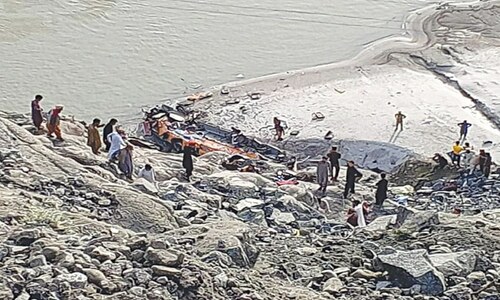Graphics taken from the survey report. DK stands for ‘don’t know’ and NR for ‘no response’.
 ISLAMABAD, Dec 15: General Pervez Musharraf is more popular in Pakistan than Benazir Bhutto and Nawaz Sharif, according to the findings of the research wing of the US Republican Party.
ISLAMABAD, Dec 15: General Pervez Musharraf is more popular in Pakistan than Benazir Bhutto and Nawaz Sharif, according to the findings of the research wing of the US Republican Party.
The survey ranked Ms Bhutto and Mr Sharif second and third, respectively, in terms of popularity after President Musharraf. The survey was ordered by the International Republican Institute (IRI) of the party and conducted in September.
Dawn has obtained the survey’s broad findings which are yet to be made public and many of which would make politicians sit up. IRI officials made a PowerPoint presentation -- second after the one in June -- to Benazir Bhutto in Dubai last week and Nawaz Sharif in London earlier.
 Their reaction to the findings is not known but the two exiled leaders can take heart that more people now want them to be allowed to return home to contest the next general election -- 70 per cent against 66 per cent in June.
Their reaction to the findings is not known but the two exiled leaders can take heart that more people now want them to be allowed to return home to contest the next general election -- 70 per cent against 66 per cent in June.
Pakistan People’s Party Chairperson Benazir Bhutto should be happy that she beat President Musharraf in popularity in Sindh. She may have to rearrange her cards to deal with the most popular ‘political personality’ in Pakistan, according to the survey.
The survey showed some changes in the voters’ perception of the political landscape since IRI’s earlier survey conducted in June. The survey rated the PPP ‘the most favoured party in Sindh and the NWFP’ while it comes No2 in Balochistan and No3 in Punjab.
According to the survey, MMA leads in Balochistan while the PML-Q is at the top in Punjab, followed by Mr Sharif’s PML-N. Popular “political personalities” are rated on a scale from 1 to 5. Gen Pervez Musharraf emerges at the top with 3.47 points, Benazir trailing with 3.31 points, Prime Minister Shaukat Aziz 3.18 and Nawaz Sharif 3.17.
 However, Ms Bhutto is far ahead of Gen Musharraf in terms of popularity in Sindh, where she has been rated at 3.91, and Gen Musharraf at 3.1.
However, Ms Bhutto is far ahead of Gen Musharraf in terms of popularity in Sindh, where she has been rated at 3.91, and Gen Musharraf at 3.1.
A finding of concern to the opposition will be that 37 per cent of the respondents said that “PML-Q deserved to be re-elected”. PML-Q was found to be a shade more popular than Ms Bhutto’s PPP at the national level, their respective ratings being 3.4 and 3.3.
However, in Sindh the PPP is at the top with a rating of 3.84, while the PML-Q scored only 2.8. The PML-N occupied third place in the country and in Sindh with respective scores of 3.09 and 2.45.
 To the question which party they would vote for “if the elections for National Assembly are held next week,” 27.4 per cent respondents named PML-Q and 22 per cent the PPP. But in Sindh 46 per cent of the respondents said they would vote for PPP and 14 per cent for PML-Q.
To the question which party they would vote for “if the elections for National Assembly are held next week,” 27.4 per cent respondents named PML-Q and 22 per cent the PPP. But in Sindh 46 per cent of the respondents said they would vote for PPP and 14 per cent for PML-Q.
Another surprising finding was that 22 per cent of the respondents thought Shaukat Aziz would be the “best prime minister”. On that count, Ms Bhutto scored a respectable 19 per cent and Nawaz Sharif only 11 per cent. A significant 16 per cent did not know who can be the best prime minister.
In the previous survey, Ms Bhutto was at the top of the ‘best prime minister’ category. It appeared that somehow Mr Aziz improved his public standing in just three months.
 Fifty-two per cent of the respondents believed that elections under a neutral caretaker government would be more transparent. Opposition parties have been saying that free and fair polls cannot be held under Gen Musharraf. But 36 per cent of the respondents disagreed with that notion.
Fifty-two per cent of the respondents believed that elections under a neutral caretaker government would be more transparent. Opposition parties have been saying that free and fair polls cannot be held under Gen Musharraf. But 36 per cent of the respondents disagreed with that notion.
It would also worry the opposition that 37 per cent of the people surveyed believed that the "current ruling coalition has done its job well enough to deserve re-election" with 36 per cent opposing the re-election of the regime on the basis of its performance.
The respondents were equally divided in response to the question whether things in Pakistan were moving in the ‘right direction’. As many as 44 per cent said that Pakistan was heading towards ‘wrong direction’ but 43 per cent believed that the rulers had put the country back on right track.
While 24 per cent of the people surveyed mentioned inflation and unemployment as the ‘two most important problems’ confronting people, 34 per cent believed the economic situation would improve ‘next year’ with 28 per cent expecting the same economic conditions to prevail next year.
Similarly, 26 per cent people said their personal economic condition had improved since the 2002 general election. But for 35 per cent, it remained unchanged while for another 35 per cent the economic situation worsened over the past four years.














































Dear visitor, the comments section is undergoing an overhaul and will return soon.